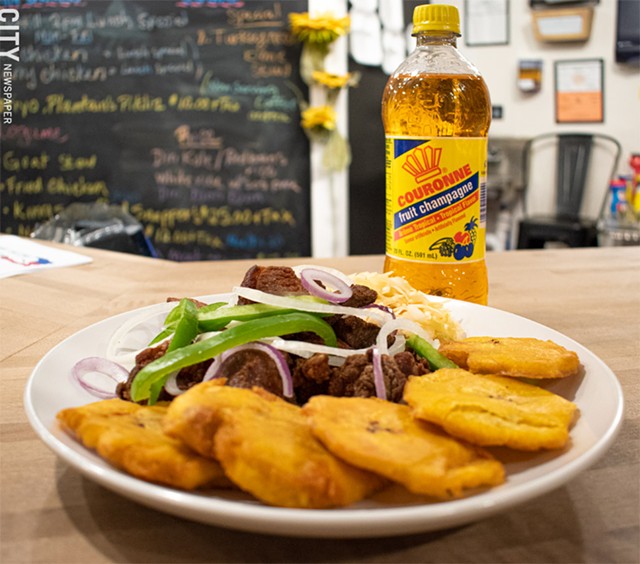Winter is here, and unlike the final season of Game of Thrones, it will last longer than six weeks. But if you're not a big fan of snow, it may be just as disappointing. Rochester's winters tend to be long and drawn out, like the release date of the final installment of the GoT novel series.
It's easy to feel a little melancholy as the nights fall early and the sun rises later. My go-to pastime when I am longing for warmer months is to eat food that reminds me of summer. Rochester has no shortage of Caribbean restaurants — I've written about Jamaican, Puerto Rican, and Dominican spots around town, but what about Haitian food? Louisiana's Haitian Restaurant might just be your new favorite spot to get a dose of lively summer flavor in the dead of winter. I had a meal there on the eve of the last snow squall, and not a thing bothered me as I enjoyed the home-style Haitian food with soul.

- PHOTO BY JACOB WALSH
- Griyo (fried pork), fried plantains, and picklin (fermented cabbage).
Louisiana's is a family-run business. Kenoi Metales owns it, but the restaurant is named after his wife, who is also the head chef. Their daughters Marjorie Gay and Jenny Metales handle much of the front end management. They've been open since September, and say business has been good. Besides the neighbors in the Plymouth Avenue area, Louisiana's serves the students and staff of the nearby University of Rochester, and there's also a decent-sized Haitian population in the area who are excited about the new restaurant serving food from home.
The Metales family themselves have been in the Rochester area since the 1980s. Louisiana has always had a fervent passion for cooking, and the family members say they want to leave a legacy for the younger generations.
Louisiana's has all the key aesthetic elements that I appreciate in an Afro-Caribbean restaurant. A huge, wall-sized chalk board behind the counter has a set of two artfully illustrated Haitian flags on the top corners, sitting like curtains raised to introduce the full menu. Hanging on the other walls throughout the shop are a map of Haiti and various pieces of African and African-American art. A mix of kompa, soca, and dancehall music was playing, serenading me as I waited for my order to be filled. Sisters Marjorie Gay and Jenny Metales would intermittently speak Haitian Creole to their parents while their mother cooked. The longer I stayed there, the more I felt like a dinner guest at someone's house as opposed to a customer in a restaurant. I almost forgot about all the snow outside.
I could smell food cooking as soon as my senses adjusted to the warmth inside, away from the frigid street. But I couldn't tell what exactly I was smelling, likely a mix of a few things. I just knew it smelled good, like a stew set to simmer. The menu is simple, yet full of choices. There are three chicken dishes, griyot (pork), a hearty vegetable stew, red snapper, and lumbi (sometimes spelled lambi).
The lumbi stuck out to me, as it's a stew made with conch, a small shellfish that I hadn't had since the summertime. Sadly, they were out that day — it's quite popular. I opted for a red snapper fillet ($14), which came with a heaping serving of red beans and rice, steamed cabbage, and double-fried plantains. While chatting with Gay, Jenny Metales also gave me a small salad to munch on while I waited for the main course to arrive to the table.
The huge snapper fillet was light and flaky, but also hearty and solid, and coated with a blend of spices that gave the top a reddish hue and a light crisp. I had never had snapper served this way before. Usually, I'd have it garnished with some salt and pepper and a bit of lemon, but this was a major upgrade. The milder flavors of the rice, beans, and cabbage were a perfect contrast to the sharp taste of the snapper.
Me being me, I decided it a good idea to dose my meal, including the remaining salad, with the house-made hot sauce. I was skeptical at first because of how thin it was, but that's the result of double-straining the peppers so no seeds get into the concoction. It's an extra spicy orange habanero sauce that's the perfect accent for anything it touches. Be warned: only a little bit is needed. It looks innocuous enough, but it's frankly more potent than most store-bought sauces.
Louisiana's Haitian Restaurant is the perfect escape from the bitter cold. My only two complaints are that the to-go sporks are too small for my appetite, and that after such a satisfying meal, I had to go back out into the burgeoning Upstate tundra.
Chris Thompson is a freelance writer for CITY. Feedback on this article can be directed to [email protected].